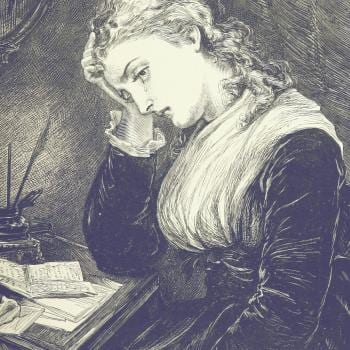I’m calling 2020 The Year ‘O Fear. But I don’t want to talk about that right now. Maybe later. Instead, I am going to share (that’s a Christian word) a very pertinent passage from Murder Must Advertise. I’ve given up reading new books for the moment because life is stressful enough. I’m going back to the ones I know are likely to pull me back from the edge of whatever precipice we all might or might not be standing next to. Also, the cat for some reason I can’t fathom woke me up in the middle of the night just to say hello. She is so friendly, but also, I think she probably could have waited two or three hours and spent more time killing the mice that like to gad about in the small hours. So here is Dorothy Sayers saying something I’ve been thinking for the last many weeks (ever since I wrote this):
The very work that engaged him–or rather, the shadowy simulacrum of himself that signed itself on every morning in the name of Death Bredon–wafted him into a sphere of dim platonic archetypes, bearing a scarcely recognizable relationship to anything in the living world. Here those strange entities, the Thrifty Housewife, the Man of Discriminiation, the Keen Buyer and the Good Judge, for ever young, for ever handsome, for ever virtuous, economical and inquisitive, moved to and fro upon their complicated orbits, comparing prices and values, making tests of purity, asking indiscreet questions about each other’s ailments, household expenses, bed-springs, shaving cream, diet, laundry work and boots, perpetually spending to save and saving to spend, cutting out coupons and collecting cartons, surprising husbands with margarine and wives with patent washers and vacuum-cleaners, occupied from morning to night in washing, cooking, dusting, filing, saving their children from germs, their complexions from wind and weather, their teeth from decay and their stomachs from indigestion, and yet adding so many hours to the day by labour-saving appliances that they had always leisure for visiting the talkies, sprawling on the beach to picnic upon Potted Meats and Tinned Fruit, and (when adorned by So-and-so’s Silks, Blank’s Gloves, Dash’s Footwear, Whatnot’s Weatherproof Complexion Cream and Thingummy’s Beautifying Shampoos), even attending Ranelagh, Cowes, the Grand Stand at Ascot, Monte Carlo and the Queen’s Drawing-Rooms. Where, Bredon asked himself, did the money come from that was to be spent so variously and so lavishly? If this hell’s-dance of spending and saving were to stop for a moment, what would happen? If all the advertising in the world were to shut down tomorrow, would people still go on buying more soap, eating more apples, giving their children more vitamins, roughage, milk, olive oil, scooters and laxatives, learning more languages by the gramophone, hearing more virtuosos by the radio, re-decorating their houses, refreshing themselves with more non-alcoholic thirst quenchers, cooking more new, appetizing dishes, affording themselves that little extra touch which means so much? Or would the whole desperate whirligig slow down, and the exhausted public relapse upon plain grub and elbow-grease? He did not know. Like all rich men, he had never before paid any attention to advertisements. He had never realized the enormous commercial importance of the comparatively poor. Not on the wealthy, who buy what they want when they want it, was the vast superstructure of industry founded and built up, but on those who, aching for a luxury beyond their reach and for a leisure for ever denied them, could be bullied or wheeled into spending their few hardly won shillings on whatever might give them, if only for a moment, a leisure and luxurious illusion. Phantasmagoria–a city of dreadful day, of crude shapes and colours piled Babel-like in a heaven of harsh cobalt and rocking over a void of bankruptcy–a Cloud Cuckooland, peopled by pitiful ghosts, from the Thrify Housewife providing a Grand Meal for Fourpence with the aid of Dairyfields Butter Beans in Margarine, to the Typist capturing the affections of Prince Charming by a liberal use of Magnolia Face-Cream.
It strikes me, watching the chaotic snatches of footage emerging from CHAZ, that Phantasmagoria is exactly right. It’s fine to have all the stuff in the world (except that there is nowhere to put it) but not at the expense of real meaning, of peering underneath to the thing that can’t be seen with the human eye–not the self, as Glennon Doyle insists–but to the sublime beauty of a God who is greater than the next thing any of us could buy. Having to stare at the self for several minutes, without the usual distractions of our burgeoning and “healthy” economy, was exactly the sort of “pause” I suppose Sayers might have imagined. What happens when it all stops? Well, everyone shops online, and at the end, everyone melts down. The main thing we wanted to buy was stuff, not truth, not goodness, not virtue. And observe the rage. A generation of people are so angry, and, one might conjecture, rightly so.
Anyway, if you’re looking for something to read, Murder Must Advertise is always very good.

















